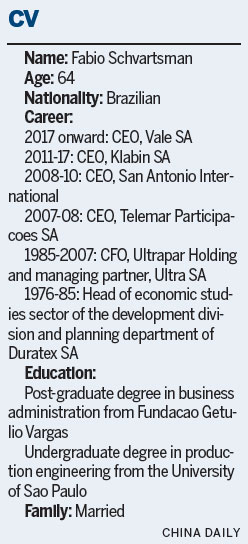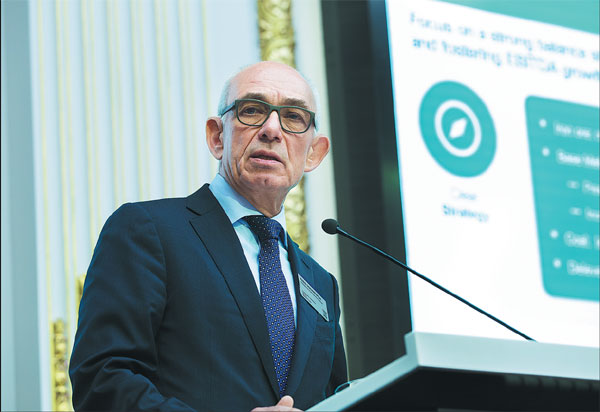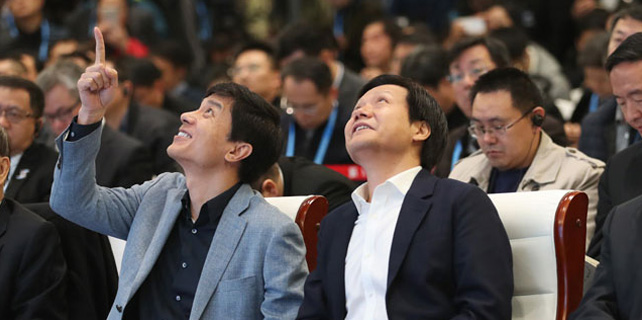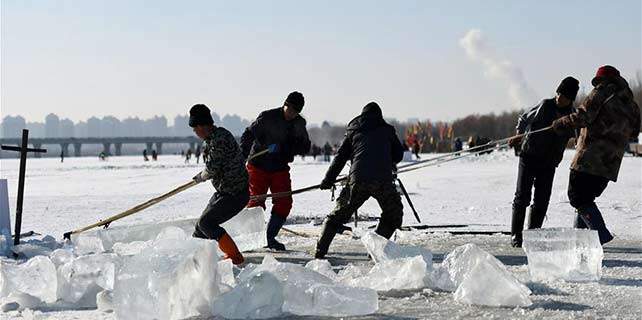Vale steels itself for major opportunities
China's efforts to reduce pollution and improve productivity are expected to boost the demand for high-quality iron ore
China's efforts to reduce pollution and improve productivity are expected to boost demand for high-quality iron ore, and that represents an opportunity for suppliers that offer top-quality ore, says Fabio Schvartsman, CEO of Brazilian mining conglomerate Vale SA.
"We have just finalized the largest investment in our history, the S11D project, which enables us to continuously supply high-quality iron ores to the market, and this is a happy matching between what China is demanding and what Vale is able to supply," Schvartsman says.
|
Fabio Schvartsman, CEO of Brazilian mining conglomerate Vale SA, believes Chinese demand for high-grade "green" ore will rise further, while China also presents many golden opportunities for Vale. Provided to China Daily |
Vale is well prepared to continuously supply China with high-quality iron ores, which will enable higher productivity for Chinese steel mills, a reduction in the use of coke and fewer emissions during the steel-making process, he says.
The company, eyeing China's fast-developing new energy vehicle industry, will also continuously diversify its non-iron ore business, and further expand into base metals, especially nickel, copper and cobalt, for growth in the long term.
The company is celebrating its 45th year of partnership with China in 2018. In an exclusive interview with China Daily, Schvartsman talks about his understanding of the Chinese mining market, the opportunities he sees in China's ongoing supply-side structural reform and his management philosophy.
How do you describe Vale's business in China in recent years? What's your forecast for Vale's prospects in the country in the next five to 10 years?
The growth of Vale was totally connected to the development of China, particularly since the country started reform and opening-up 40 years ago. It is the fact that China was developing and we were partnering with this great country that helped us create this fantastic company.

We continue to hold a positive outlook for the Chinese economy in the future. We believe that Chinese demand for high-grade "green" ore will rise further, while China also possesses many golden opportunities for Vale, considering the Belt and Road Initiative, the regional integration projects of the Pearl River Delta, Yangtze River Delta and Jing-Jin-Ji (Beijing-Tianjin-Hebei) area, as well as the ongoing urbanization. We are fully convinced that the best years of the Vale-China partnership are yet to come.
China's continued efforts to reduce pollution are expected to boost demand for Vale's high-quality iron ore. How will that affect Vale's business in the country and worldwide?
With the purpose of improving productivity and reducing pollution, the Chinese steel industry's demand has changed from non-differentiate iron ores to high-quality iron ores. This represents an opportunity for Vale.
China's efforts to reduce pollution also drive the growth of new energy vehicles, the production and sales of which are expected to reach 15 million units in 2030. This will positively affect our base metal business, since the majority of our nickel products are very well suited to electric vehicles. We also produce cobalt and copper, which are also critical elements for the electric vehicle and battery production process.
What are the major challenges for your company's operation in China? Does the long-distance transportation of the iron ore pose a cost disadvantage?
Vale faces the challenge of geographic distance from China. In order to address this challenge, the company has come up with the Valemax vessels, which are also known as very large ore carriers, to ship our high-quality iron ore from Brazil to China in a most efficient and green way.
The company's 30 second-generation 400,000-DWT Valemax vessels are currently under construction to serve the seaborne iron ore trade. They could further reduce carbon dioxide by nearly 20 percent, compared to their first generation, which have already been in operation and effectively reduced carbon dioxide by 30 percent compared to the conventional 180,000-DWT Capesize vessels.
Valemax vessels are designed in China; most of them are constructed and financed in China as well. Thanks to the close cooperation with our Chinese partners in various areas, Vale has been as competitive as our Australian peers, despite the geographical distance.
What are the reasons for Vale's 38 percent increase in net profit last year? What are your predictions for the iron industry in the next few years?
Our 2017 performance showed remarkable cash generation and substantial net debt reduction as a result of improvements in price realization, strict discipline in capital allocation and slightly improved results from nickel and coal assets.
2017 was a turning point for Vale. We started ambitious changes in efficiency, cost management and corporate governance. We laid the foundations for diversifying cash generation by improving the asset base we have today to reduce our dependence on iron ore. We aim to transform Vale into a predictable company.
How is Vale's effort going in diversifying its business from iron ore?
Vale has a very large and very successful iron ore business. However, to be so dependent upon iron ore is not a good bet because, like other commodities, iron ore is volatile. That's why we want to diversify cash generation and reduce dependence on iron ore.
We plan to continue to grow in iron ore while realizing more value from our existing assets, especially in base metals, where we think we have a big opportunity. We believe that our nickel, cobalt and coppers will be positively affected by the development of new energy vehicles, especially in China.
What business opportunities do you see from China's Belt and Road Initiative?
The Belt and Road Initiative represents a clever way of using the installed capacity of steel in China and represents sustainable demand for Vale's products, including iron ore and base metals, as infrastructure and energy projects play the biggest role - thereby securing not only direct steel consumption but also indirect need for machinery, rail and manufactured goods. We will embrace the opportunities it brings to us.
What role has Vale played in China's reform and opening-up and how has Vale benefited from it?
As a long-term partner of China, Vale is very proud to have witnessed China's reform and opening-up as both beneficiary and contributor over the past four decades. Since our first shipment of iron ore, sent to China in 1973, Vale has supplied a total of 2 billion tons of high-quality iron ore to China. At the same time, Vale has directly and indirectly procured a total of $10 billion of Chinese goods and services for our key projects and business in Brazil and other countries and regions over the past decade.
What is your company's biggest achievement here since entering China?
The 45 years of partnership with China could be one of our most important achievements.
Vale sent our first shipment of iron ore to China back in 1973. The amount sold to China represented only 0.1 percent of all the iron ore sold by Vale at that time. Now China is Vale's largest market in the world, and more than 50 percent of our iron ores are sold to China. At the same time, the bilateral trade between Brazil and China has also soared from tens of millions of dollars in the 1970s to over $75 billion in 2017. We believe that Vale and China have the necessary conditions and win-win attitude to further our relationship and generate mutual prosperity.
How will Vale keep its edge and maintain its advantage against competitors?
Vale is blessed with the world's highest-quality iron ore. We have also started blending our ores in Chinese ports, which could not only meet our clients' demands for quality but also benefit our clients with various advantages, such as just-in-time supply, flexible lot sizes and multiple points of sales, thus reducing their safety stocks.
Vale is also the only company that is selling iron ore in Chinese currency. This opens the door for the smaller clients in China that have limited access to foreign currency.
What's your view about China's ongoing efforts to address overcapacity?
We are very impressed with the speed of China's ongoing efforts to address overcapacity.
We think the cuts in overcapacity could result in higher demand for high-grade ores. On the one hand, as the reduction of excess capacity focuses mainly on the small, private mills, big steel mills could have better margins and demand for higher-grade ore. On the other hand, closure of small blast furnaces could force steel mills to increase productivity of remaining larger blast furnaces, which should result in higher demand for high-grade ore as well.
What's your management philosophy?
My management philosophy consists of teamwork and meritocracy.
What are your hobbies?
Running, cycling and skiing.
zhengxin@chinadaily.com.cn
(China Daily European Weekly 05/11/2018 page31)



















